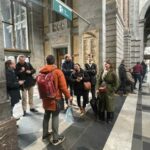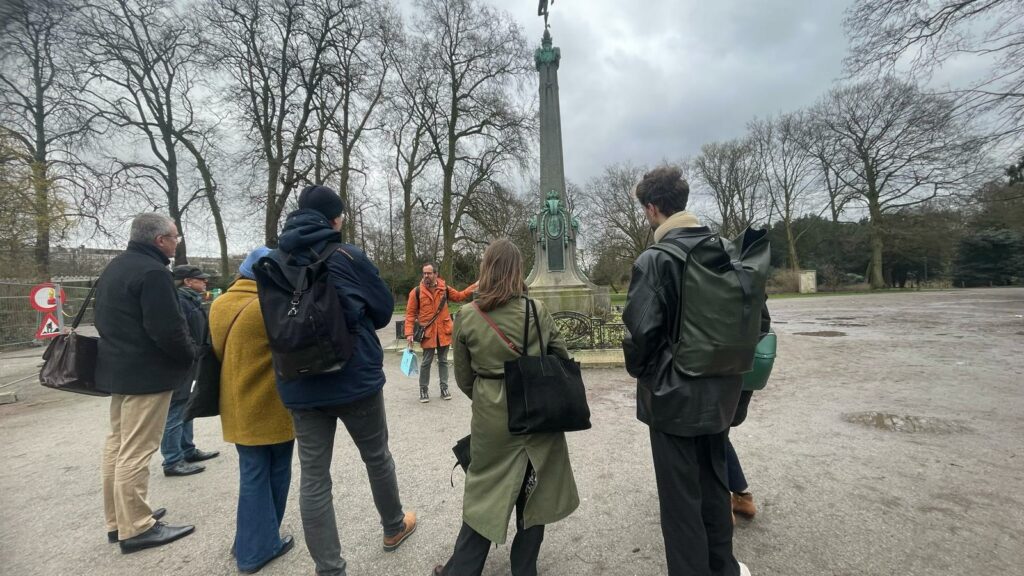 The two-day workshop titled “Working in an International Academic Community” which was Module 5 of the RSPH tutorials took place 23-24 February at the University of Antwerp, allowing PhD students to participate from Germany, Netherlands and Belgium. This wide-ranging, transnational, transdisciplinary, and cross-cultural nature of the workshop allowed for constructive discussions to take place over the course of the two days.
The two-day workshop titled “Working in an International Academic Community” which was Module 5 of the RSPH tutorials took place 23-24 February at the University of Antwerp, allowing PhD students to participate from Germany, Netherlands and Belgium. This wide-ranging, transnational, transdisciplinary, and cross-cultural nature of the workshop allowed for constructive discussions to take place over the course of the two days.
Dr. Shaeri-Yazdi’s talk regarding the challenges of being consistent with producing publications throughout one’s academic career, through added layers of challenges, specifically as a person of colour, it allowed one to prepare and streamline the publication plan for the post-PhD career which is soon to follow. Additionally, Dr. Schmidt’s talk about his career and journey towards becoming a Japanologist was inspiring and motivating for young scholars who aim to pursue a career studying areas and histories outside of Europe. The second day of the workshop allowed us to brainstorm and develop ideas for forming a panel together for the Annual APH Conference to be held in Antwerp in 2025. My group was able to form a panel titled, “Solidarities, spaces and silences: The politics of movement”.
The discussions revolved around viewing ‘movement’ within colonial (and post-colonial) structures as it shaped resistance to existing structures of coloniality. The colonial structures such as trade routes, circulation networks and infrastructures which were developed to strengthen and establish ideas of coloniality were often also utilized by those resisting coloniality, whereby the people and knowledge moved within these spaces and converged to produce revolutionary movements, human rights campaigns, knowledge-sharing networks, and new strategies of resistance. The spaces which these actors inhabited, or moved within, informed their knowledge and ideas, and subsequently shaped their political practices. We discussed ideas on how to analyse coloniality by viewing how people navigated, negotiated, and resisted these structures of power.
Our projects had far-ranging areas of research geographically, such as the post cities of the Caribbean, in Curacao, Trinidad and Venezuela, to the resistance movements in Zimbabwe and Zambia, to the diplomats and human rights activists of South and Southeast Asia, and back to the University of Antwerp itself. We tried to view our actors in terms of their solidarities through intersectionality, whereby the strategic use of intersectionality by movements illustrated how the solidarities were formed and protected through the acknowledgment and integration of diverse, convergent identities and experiences, challenging both colonial and contemporary forms of exploitation.
 It was, overall, an engaging workshop, which allowed diverse discussions on decoloniality and decolonial thinking, which had previously been overlooked to a large extent from RSPH workshops in the past years. The discussions allowed PhD researchers to rethink and develop their ideas along the lines of a non-Eurocentric framework, which allowed for an interesting deviation from the other sessions. Perhaps a fitting end to the two days of discussions was Dr. Beyen’s excellent tour of Antwerp’s colonial monuments which commemorated the annexation of Congo to the other monuments commemorating King Leopold’s role in these annexations, which was an interesting intersection of cultural and political history in the public sphere.
It was, overall, an engaging workshop, which allowed diverse discussions on decoloniality and decolonial thinking, which had previously been overlooked to a large extent from RSPH workshops in the past years. The discussions allowed PhD researchers to rethink and develop their ideas along the lines of a non-Eurocentric framework, which allowed for an interesting deviation from the other sessions. Perhaps a fitting end to the two days of discussions was Dr. Beyen’s excellent tour of Antwerp’s colonial monuments which commemorated the annexation of Congo to the other monuments commemorating King Leopold’s role in these annexations, which was an interesting intersection of cultural and political history in the public sphere.
Maha Ali
26 March 2024
